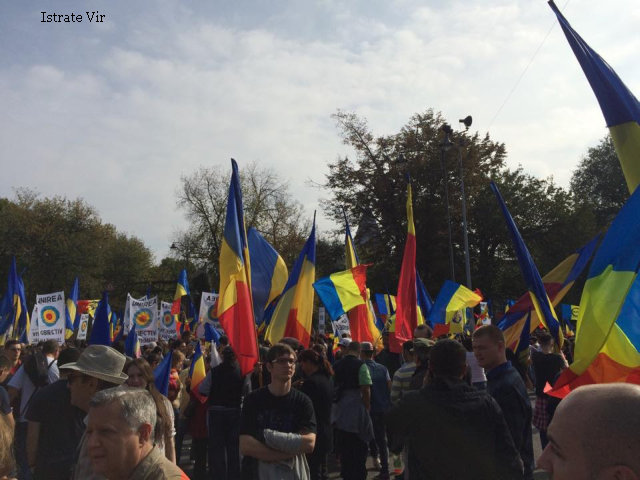Bessarabia and Romania
Thousands of Romanians went to the streets on Sunday to voice their solidarity with their fellows in the Republic of Moldova

Bogdan Matei, 13.10.2014, 13:21
Although the Romanian public space is rather agitated with the campaign for the upcoming presidential elections, the center of capital Bucharest on Sunday became a place of harmony. For a few hours, people forgot about political interests in the name of a goal beyond any party interests: solidarity with the Republic of Moldova. According to the organizers, over ten thousand people took part in a march showing support for the neighboring country’s European aspirations. Students and pensioners, professors and workers, right wing and left wing militants, citizens of Bucharest and of Chisinau, all voiced their conviction that, against the current political background, the union of the two states is the only way to prevent the Republic of Moldova from becoming the victim of a Russian aggression similar to the one against Ukraine.
That was the third March for Bessarabia, whose first edition took place in 2012, when the two countries commemorated 200 years since the first annexation of that Romanian province by tsarist Russia. The current republic of Moldova, which proclaimed its independence after the failure of the neo-Bolshevik coup of August 1991 in Moscow, was created on part of the territory of historical Bessarabia, united with Romania after the First World War and re-annexed by the Soviet Union in 1940. “Bessarabia is Romania!” was the slogan chanted by marchers on Sunday, and recent sociological studies show that this opinion is shared by a significant part of society.
The proportion of Romanian citizens who stand for union has always been rather overwhelming, ranging from 70 to 90% of the total population. Although more reluctant than their Romanian fellows, Bessarabians seem to have moved away from the anti-Romanian prejudice inoculated by the Soviet propaganda along half a century of occupation. According to the surveys made over the past year, 52% of the Bessarabians have become supporters of the two countries’ union. Nobody believes, though, that this can be done right away, and the Romanians on the two banks of the River Prut will probably get together as citizens of the EU first.
The pro-western three-party coalition in Chisinau has over the past five years promoted deep reforms, sometimes painful, this summer awarded by the EU with association and free-trade agreements. However, parliamentary elections are due in the Republic of Moldova on November 30th, and their stake is not just political, but also geo-political. Ranked first among voters’ preferences, the pro-Russian communist party, thirsty of revenge after losing its seats in 2009, has threatened that, if back to power, it will turn the Republic of Moldova away from Brussels and towards Vladimir Putin’s Russia.






























